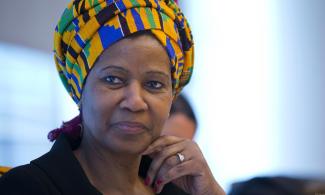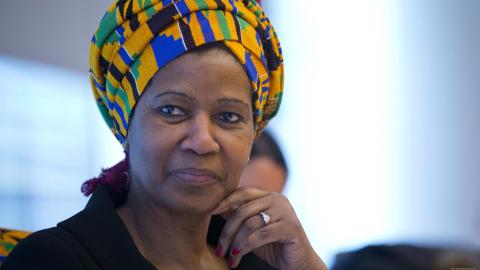
Mlambo-Ngcuka was also prominent in drawing international attention to the plight of the still-missing female students kidnapped by Boko Haram in Nigeria last April.
She is perhaps the most powerful African woman on earth, leading a major United Nations agency that focuses on women’s issues on the global scene. With her post as Executive Director of UN Women, while also holding the title of Under-Secretary General, Phumzile Mlambo-Ngcuka is in a unique position at the world body.
Last year the U.S.-based Ebony magazine called her “the Jackie Robinson of a major international agency”, because she is the first Black woman to hold such a title at the United Nations.

Phumzile Mlambo-Ngcuka was appointed to the dual posts at the UN in August of 2013. Yet, she came to the job with an impressive record as a South African government minister prior to her promotion.
She has led several programs to fight against poverty in her homeland, programs that with special force were geared to share the benefits of economic growth that had a focus on empowering women. South Africa, a nation still reeling in the post-Apartheid era, remains a nation with great potential. At the same time, while being a champion of social justice, women’s rights, and gender equality in civil society, Mlambo-Ngcuka had a larger vision with a global focus.
She has largely downplayed her position in the diplomatic community as “a first”, while understanding her global position as historic in becoming the first non-white female to lead the massive UN Women agency. Yet, since assuming the dual UN posts of Under-Secretary General, and UN Women Executive Director, Mlambo-Ngcuka has laid out what she calls a “five point mission” to enhance women’s economic empowerment around the world.
Mlambo-Ngcuka spoke with the U.K.-based newspaper The Guardian, as she now enters her second year holding the dual titles. In that interview on the matter of gender empowerment, she carefully laid out part of her vision.
To a specific question on gender equality and empowerment she said, “Women’s economic empowerment is absolutely essential to gender equality. It’s a matter of basic fairness that women are able to fully and equally participate in the economy. With a livelihood and an income of their own, women have increased status, can provide for their families, and become empowered in other parts of their lives as well, such as making decisions about education, housing, food choices, and medical care.”
“There’s hard evidence that gender equality and women’s empowerment are powerful drivers of economic growth and national income. For example, a recent International Monetary Fund study found that gender equality in labor participation rates would have a strong positive impact on GDP growth,” Mlambo-Ngcuka concluded on that issue.
Education is key to achieving that goal, she later said in the Guardian interview.
Mlambo-Ngcuka was also prominent in drawing international attention to the plight of the still missing female students kidnapped by the Boko Haram in Nigeria last April.
She visited Nigeria in May, and made an appearance at the Federal Government Girls College (FGGC) in the town of Abaji during a quiet two-day visit there from 17-18 of May. It was there in an emotional address she declared, “We are standing with you. We are going to be here, and we will work with you to ensure that when the girls return they are consoled, and with their families they get the support they need. The girls of Nigeria deserve the best education, and the best care and support.”
Later, at the Global Summit to End Sexual Violence in Conflict held in London, England, last June, Mlambo-Ngcuka was instrumental in hammering through the UN’s “Guidance Note on Reparations for Conflict-Related Sexual Violence”. The UN had issued a blueprint for promoting what was termed, “gender-sensitive approaches” to the design and delivery of reparations for victims of conflict-related sexual violence.
With one year under her belt Mlambo-Ngcuka’s work is hardly finished. There is still more work to be done, she said. As for what comes next she said she is looking to the future.
“Next year, the Millennium Development Goals will expire, and a new set of Sustainable Development Goals will establish a new agenda for global development,” she told The Guardian. “Through the new agenda we want to demolish the major barriers holding back women and girls from achieving their potential and release that force for growth and change into the world’s economies and societies,” she concluded.